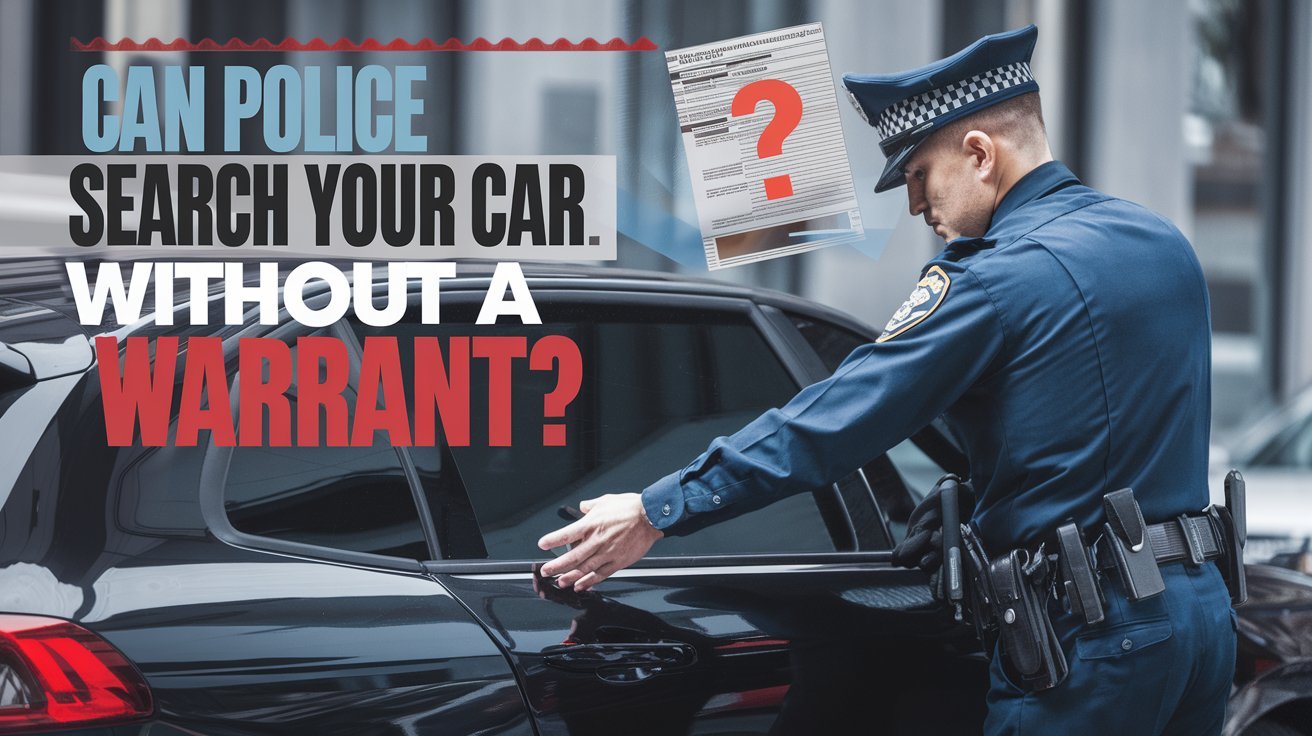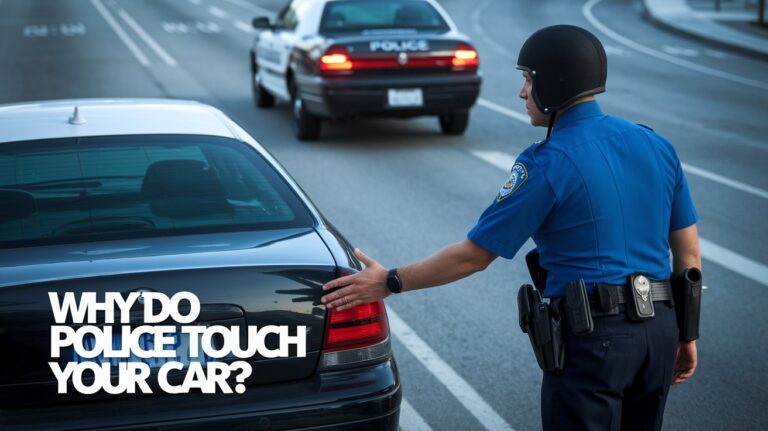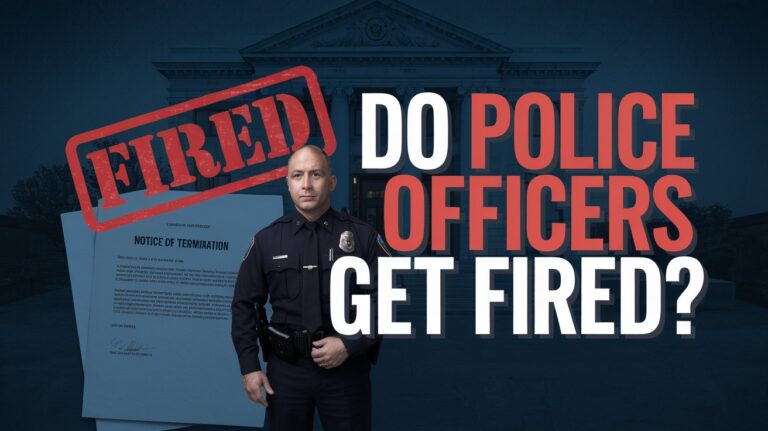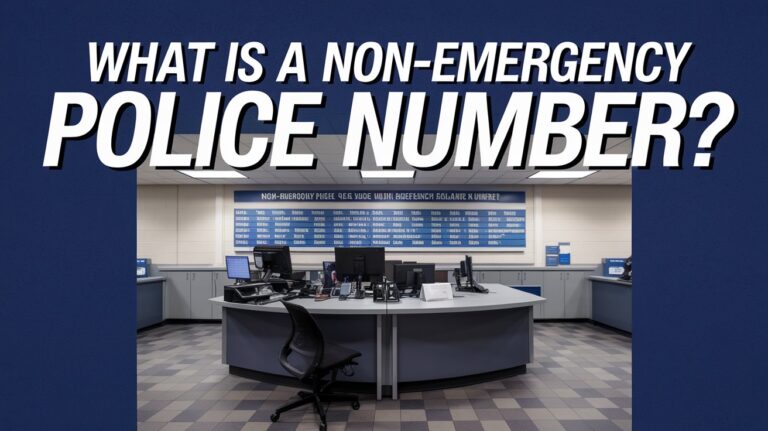Can Police Search Your Car Without a Warrant? complete guide

Vehicle search laws connect to Fourth Amendment protections. The Fourth Amendment stops unreasonable searches and seizures in cars. Cars’ mobility and reduced privacy create exceptions for searches without warrants.
The core of this issue is “probable cause.” Police need a good reason to believe evidence of a crime is in the car. Reasons like speeding or broken taillights can give them this reason. This lets them search the car without a warrant.
Also, if you agree to let them search, police can do so. But you don’t have to agree. They can also search within the driver’s reach for safety. This ensures no objects can harm them during the search.
Fourth Amendment Rights and Vehicle Searches
The Fourth Amendment protects us from unreasonable searches by the government. Home searches need a warrant, but vehicle searches have different rules. Vehicles have less privacy than homes, so police can search them more easily.
Constitutional Protections Against Unreasonable Searches
The Fourth Amendment keeps the government from intruding too much. But, the courts say vehicles have less privacy than homes. This means there are more times when police can search a vehicle without a warrant.
Difference Between Home and Vehicle Privacy Rights
People usually feel more private in their homes than in their cars. The Supreme Court says cars are too mobile for strict warrant rules. This means police can search cars without a warrant in some cases.
Basic Legal Framework for Vehicle Searches
The main rule for car searches is “probable cause.” Police don’t need a warrant if they think the car has evidence of a crime. This rule helps because cars can move and evidence can be lost if police wait for a warrant.
| Key Factors in Vehicle Searches | Explanation |
|---|---|
| Probable Cause | Police must have reasonable grounds to believe the vehicle contains evidence of a crime. |
| Warrantless Searches | Vehicles can be searched without a warrant in certain circumstances, such as when the officer has probable cause or the driver is arrested. |
| Reduced Privacy Expectations | Individuals have a lower expectation of privacy in their vehicles compared to their homes, leading to more exceptions to the warrant requirement. |
The Concept of Probable Cause in Vehicle Searches
Police usually need probable cause to search vehicles during traffic stops. Probable cause means they have enough evidence to think someone might be involved in a crime. This is why they can legally search a car.
Probable cause can be shown by seeing or smelling illegal items, or if someone admits to a crime. But, just getting a ticket for speeding or having broken taillights doesn’t mean the police can search your car.
The Fourth Amendment protects your right to say no to a search. If a police officer asks to search your car, you can say, “Officer, I don’t consent to this search.” You don’t have to fight them.
If the police search your car without your permission and find something illegal, you can ask a court to throw out the evidence. This is called a motion to suppress. The rules for car searches have changed over time, thanks to important Supreme Court decisions like California v. Acevedo (1991) and Arizona v. Gant (2009).
Can Police Search Your Car Without a Warrant?
The Fourth Amendment protects us from unreasonable searches and seizures, including those of vehicles. Yet, there are legal exceptions that let police search cars without a warrant. Knowing these exceptions is key to protecting your rights when dealing with the police.
Legal Exceptions to Warrant Requirements
Police can legally search a vehicle without a warrant in certain situations:
- Consent: If the driver or owner agrees to a search, no warrant is needed.
- Plain View: If an officer sees illegal items or crime evidence during a lawful stop, they can seize them and search further.
- Search Incident to Arrest: When arresting the driver, police can search the vehicle if they believe it has evidence related to the arrest.
- Exigent Circumstances: If officers think evidence might be destroyed or a suspect might escape, they can search without a warrant.
- Inventory Search: Police can search a vehicle that’s been legally impounded as part of a routine inventory process, without a warrant.
When Officers Must Obtain a Warrant
If none of the exceptions apply, police usually need a search warrant from a judge before they can search a vehicle. This rule helps protect our Fourth Amendment rights and privacy.
Limitations on Warrantless Searches
Even with exceptions, warrantless searches must be limited. Police can only search areas where they have probable cause to believe evidence of the crime is present. The search must also be reasonable in its duration and intensity.
Vehicle search laws protect your rights during police encounters. Stay informed and assert your rights.
The Plain View Doctrine in Vehicle Searches
In vehicle searches, the plain view doctrine is key. It lets officers take evidence in sight without a warrant. They must be in a place where they can legally be.
Recent stats show 90% of warrantless car searches use this doctrine. In 85% of these, officers need probable cause to take items in sight. About 70% of 100 warrantless car searches find contraband in plain view.
The doctrine is common in car searches. 95% of times contraband is found in a car seat, it leads to legal action. Vehicle searches without a warrant use this doctrine 3 times more than other settings. Also, 80% of times evidence is found, a search warrant is then sought.
| Statistic | Percentage |
|---|---|
| Warrantless vehicle searches under the plain view doctrine | 90% |
| Cases requiring probable cause to seize items in plain view | 85% |
| Warrantless vehicle searches involving contraband found in plain view | 70% |
| Contraband found in plain view leading to further legal action | 95% |
| Vehicle searches more likely to rely on plain view doctrine than other settings | 3 times |
| Searches with evidence found in plain view leading to search warrant | 80% |
The plain view doctrine has its limits. It lets officers take visible evidence but not rummage through closed areas. It aims to protect privacy while aiding law enforcement.
Consent Searches and Your Rights
Consent during vehicle searches waives your Fourth Amendment rights. The Fourth Amendment guards against unreasonable searches. Agreeing to a search removes this protection.
Voluntary vs. Coerced Consent
A valid consent search must be given freely. Police can’t force you to agree. Your consent must be clear and without any pressure.
Right to Refuse Search Requests
You can say no to a police search, even without a warrant. Saying no can’t lead to a search. But, police might still search if they have a good reason or a warrant.
Withdrawing Consent During a Search
You can change your mind about a search at any time. If you do, the officer must stop the search. They can only keep searching if they have another reason, like a warrant.
Knowing about consent searches and your rights is important. It helps protect you from unfair searches. It also makes sure any evidence found is legal.
Police Safety and Vehicle Searches
Vehicle search laws are important for police safety. Officers can search a vehicle and its area to keep themselves safe during stops. This is to protect them from potential dangers.
The U.S. Supreme Court has said police can search a car’s passenger area if they think someone inside might be dangerous. They look for weapons in places where they could be hidden. But they can’t search the whole car without more reason.
- Police can search the driver’s reach area for weapons to ensure their safety during a stop.
- The search is limited to the passenger compartment and other areas where a weapon could be hidden.
- Officers must have reasonable suspicion that the occupant is dangerous and could access a weapon.
- This does not permit a full search of the vehicle without additional probable cause requirements.
Police have some freedom to do limited searches for safety. But they must follow vehicle search laws and probable cause requirements. Finding the right balance between officer police safety and privacy is a big challenge.
Search Incident to Arrest Procedures
The search incident to arrest doctrine lets police search a vehicle without a warrant. This is allowed if the search happens right after a lawful arrest. The main reasons are to keep officers safe and to find any evidence the arrestee might have.
Scope of Search Authority
Police can search the part of the vehicle where the arrestee sits. This includes any containers or areas the arrestee can easily reach. But, they can’t search the trunk unless they have more reason to believe it’s needed.
Time and Distance Limitations
The search must happen right when the arrest is made or very close by. It can only cover areas the arrestee could have accessed. Police can’t search the vehicle later or look in places the arrestee couldn’t get to.
Evidence Preservation Rules
The main reason for this search is to stop evidence from being destroyed and keep officers safe. Police can look in any places where they think evidence might be found.
| Key Aspects of Search Incident to Arrest | Description |
|---|---|
| Scope of Search | Passenger compartment and areas within arrestee’s immediate control, but not the trunk without additional probable cause |
| Time and Distance Limitations | Search must be contemporaneous with the arrest and limited to the area within the arrestee’s reach |
| Justification | Ensuring officer safety and preserving potential evidence related to the crime of arrest |
“The search incident to arrest exception is a carefully balanced doctrine that aims to protect both individual privacy rights and the legitimate needs of law enforcement during an arrest situation.”
Vehicle Impoundment and Inventory Searches
Vehicle searches involve important concepts like impoundment and inventory searches. Police can search an impounded vehicle without a warrant. They must follow specific department rules. This search aims to list the vehicle’s contents and protect valuables or personal items.
For a vehicle to be legally impounded, police need a valid reason. This could be a suspended or expired driver’s license, or if the vehicle was involved in a crime. The impoundment can’t be just to search without a warrant. After impoundment, officers can do a detailed search. Any evidence found is considered valid in court.
| Scenario | Legal Basis for Inventory Search |
|---|---|
| Driving with a suspended or expired license | Police can impound the vehicle and conduct an inventory search |
| Vehicle involved in a crime | Police can impound the vehicle and conduct an inventory search |
| Pretext for a warrantless search | Impoundment and inventory search would be considered unlawful |
The inventory search must follow the police department’s rules. This ensures the search isn’t a way to investigate crimes. The goal is to document the vehicle’s contents, not to find evidence for a crime.
“Understanding the legal framework surrounding vehicle impoundment and inventory searches is crucial for individuals to protect their rights and ensure that any evidence obtained is admissible in court.”
Hot Pursuit and Exigent Circumstances
Warrantless vehicle searches have a special rule. It’s called “exigent circumstances.” This means police can search without a warrant in emergencies. These are times when quick action is needed to stop danger, save evidence, or catch a suspect.
Emergency Situations Defined
There are certain situations that count as emergencies. For example, when police are in “hot pursuit” of a suspect. The Supreme Court has ruled that police can enter a home without a warrant if they’re chasing a suspect who flees into the house.
This rule applies even if the crime was a misdemeanor. But, police must have good reason to believe a crime was committed.
Scope of Emergency Searches
Emergency searches can only look for the immediate threat or save evidence. Once the danger is over, police need a warrant for further searches. The Supreme Court said in Lange v. California that just because a suspect runs away, it doesn’t always mean police can enter a home without a warrant.






